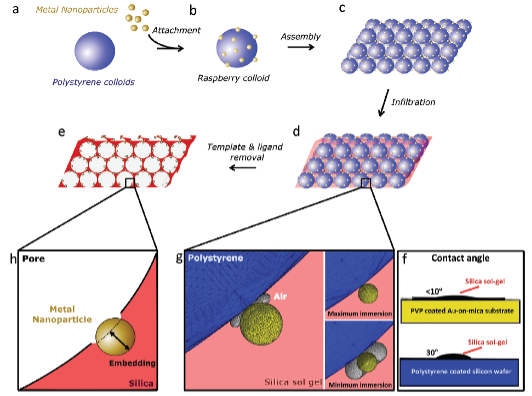
Raspberry-colloid templated (RCT) thermal catalysts
Nanoparticle-supported heterogeneous catalysts play a central role in the production of more than 90% of chemicals manufactured globally. The performance (activity, selectivity, stability) of these catalysts is predicated on a variety of descriptors related to the nanoparticles (NPs), support material, and their interactions. Current preparative methods towards these catalysts often do not permit independent changes to these coupled factors, thereby hindering the understanding on the role of each individual descriptor on the final catalytic performance.
To unequivocally elucidate structure-property relationships, the Aizenberg group has drawn inspiration from the morpho butterfly, in combination with our expertise in colloidal synthesis, assembly, and sol-gel chemistry, to devise raspberry-colloid templated (RCT) catalysts (panels a – e). The RCT catalysts enables independent combinatorial variations of the material’s building blocks and their organization, thereby affording numerous degrees of freedom for optimizing the material’s functional properties, from the nanoscale to the macroscale. Unlike catalysts prepared conventionally, the RCT method yields catalysts with NPs deeply embedded within the support matrix (panel h), conferring exceptional thermal stability (> 500 °C) for a variety of gas- and liquid-phase hydrogenation and oxidation reactions.
Team members: Garrick Lim, Selina Kaiser, Sadhya Garg, Marianne Bijl